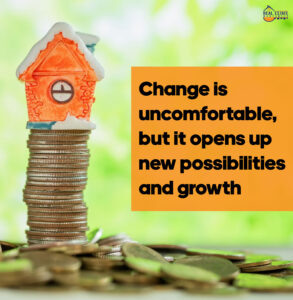In the world of real estate, change is the only constant. The market evolves due to economic shifts, technological advancements, and changing consumer behaviors. Adapting to these changes is not just beneficial—it’s crucial for achieving long-term success. Investors and entrepreneurs who recognize this need for adaptability are the ones who continue to thrive while others fall behind.
Navigating the Ever-Changing Real Estate Market
The real estate market is dynamic. Strategies that were successful last year might not yield the same results today. Economic downturns, for example, have shown how quickly market conditions can shift. Some areas might experience a sharp decline in property values, while others face increased foreclosures. In these situations, flexibility and a willingness to pivot are essential to navigate through turbulence and find new opportunities.
Technological advancements also play a significant role in how the industry operates. The days of relying solely on local newspapers or word of mouth to find properties are long gone. Today, a vast array of digital tools allows investors to browse listings, analyze market trends, and even conduct virtual tours from anywhere in the world. Keeping up with these technological changes is crucial. Those who don’t risk missing out on reaching new clients, streamlining operations, and growing their businesses.
Consumer behavior is another critical factor. Today’s buyers and sellers are more informed and have higher expectations. They demand quick responses, transparent communication, and access to comprehensive data. Failing to meet these expectations can result in lost opportunities as competitors step in to fill the gap.
The Pitfalls of Stagnation
In real estate, complacency is a significant risk. It’s easy to rely on past successes and assume that what worked before will work again. However, this mindset can lead to stagnation. The market will continue to evolve, and if you’re not willing to evolve with it, you risk falling behind.
A common mistake among investors is clinging to outdated strategies. Wholesaling, for instance, has been a staple in real estate for years. But as regulations and market dynamics change, so too must the approach to wholesaling. Sticking to the old ways without adjusting to new laws or market demands can lead to missed opportunities or even legal troubles.
Past success doesn’t guarantee future results. Investors who fail to innovate or adapt their strategies to the current market conditions often find themselves struggling to maintain their business.
Staying Ahead in a Competitive Market
Staying ahead in real estate requires a commitment to continuous learning and adaptation. The market is complex, and there is always something new to learn—whether it’s understanding the latest trends, staying updated on legal changes, or leveraging new technologies.
Networking and mentorship are invaluable tools in this process. Surrounding yourself with other professionals—whether they are fellow investors, contractors, or attorneys—provides new perspectives and strategies. A strong network can be a source of advice, support, and opportunities. Mentorship, in particular, can help you avoid costly mistakes and guide you through complex decisions.
Being proactive is also crucial. Instead of waiting for market changes to dictate your actions, anticipate changes and position yourself to take advantage of them. This might involve diversifying your investment portfolio, exploring new markets, or adopting new technologies before they become widespread.
Practical Strategies for Adaptation
To thrive in real estate, you need to take practical steps toward adaptation. Diversification is one such strategy. By investing in different property types, markets, and strategies, you not only spread risk but also open up new avenues for growth. A diverse portfolio allows you to weather downturns in one area while capitalizing on opportunities in another.
Embracing technology is another key strategy. From digital marketing tools to property management software, technology can streamline operations and enhance client experiences. For example, using a CRM system to manage leads and client relationships can significantly improve your efficiency and effectiveness in closing deals.
Flexibility is equally important. Be open to adjusting your strategies based on feedback from clients, colleagues, and the market. A small change in your approach can make a significant difference. If potential buyers consistently hesitate at your pricing, for example, it might be time to reassess your pricing strategy or enhance the perceived value of your offerings.
Real-Life Applications of Adaptation
Consider real-life examples of how adaptation can lead to success. An investor might initially plan to flip a property quickly, but if the market shifts, holding the property as a rental might be the better option. This flexibility allows the investor to generate steady cash flow while waiting for the market to recover, ultimately selling the property at a higher price later.
Another example is working with a seller who has unrealistic expectations. Rather than pushing them into a deal that doesn’t make sense, understanding their concerns and finding a win-win solution can lead to a successful transaction. This adaptability in negotiations not only closes deals but builds lasting relationships and trust.
The Power of a Resilient Mindset
Adaptation isn’t just about strategies; it’s about cultivating the right mindset. Change can be uncomfortable, but it’s also an opportunity for growth. Embracing change with a positive attitude opens up new possibilities and helps overcome the fear of the unknown—a significant barrier for many investors.
It’s important to stay motivated by setting incremental goals and celebrating small wins along the way. Real estate success is a journey, not a destination. Keeping a long-term perspective while appreciating the progress made can keep you focused and resilient.
Thriving in an Ever-Changing Landscape
In the fast-paced world of real estate, adaptability is not optional—it’s a requirement for long-term success. The market will continue to evolve, and staying informed, building strong networks, and maintaining a flexible mindset will enable you to navigate these changes effectively. By embracing change and continuously refining your strategies, you position yourself not just to survive in the industry but to thrive and achieve sustained success. The future is bright for those who are willing to adapt, learn, and grow.
Happy investing,
Dan & Jenni Innarella




